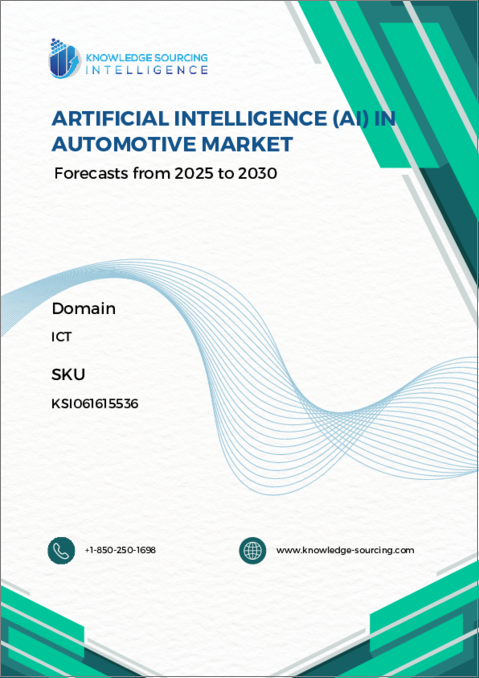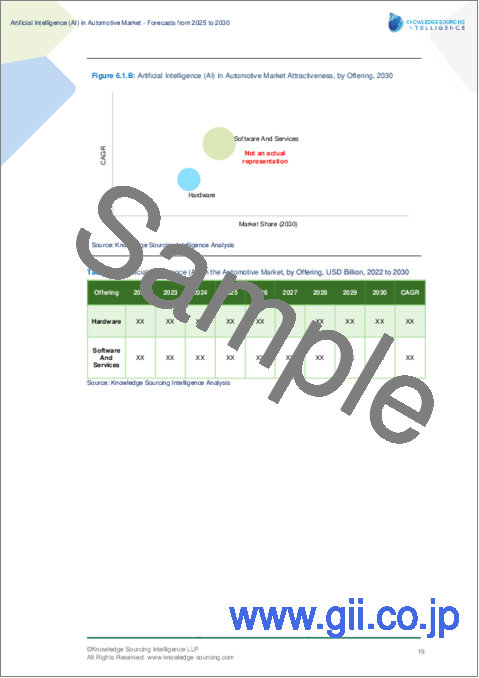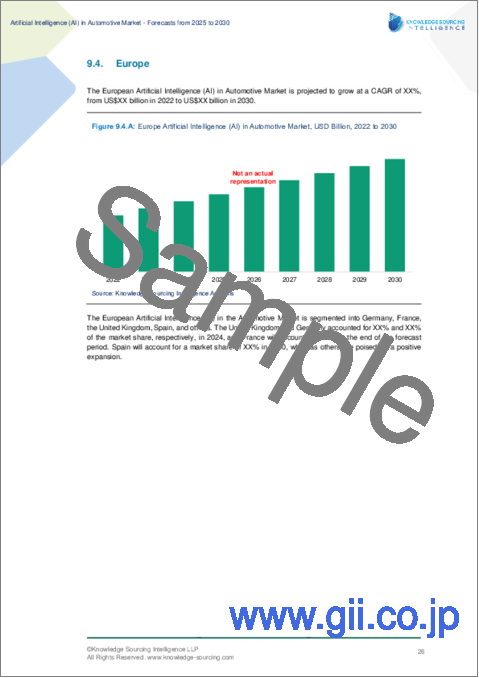|
|
市場調査レポート
商品コード
1302957
自動車向けAI市場-2023年から2028年までの予測AI in Automotive Market - Forecasts from 2023 to 2028 |
||||||
カスタマイズ可能
|
|||||||
| 自動車向けAI市場-2023年から2028年までの予測 |
|
出版日: 2023年06月21日
発行: Knowledge Sourcing Intelligence
ページ情報: 英文 143 Pages
納期: 即日から翌営業日
|
- 全表示
- 概要
- 目次
自動車向けAIの市場規模は2021年に126億6,000万米ドルとなり、CAGR 22.69%で成長し、2028年には529億8,100万米ドルに達すると予測されています。
人工知能(AI)技術は、運転手のいない自動車、タクシー、車両、バスから製造施設の産業用ロボットに至るまで、自動車分野で広く利用されています。その結果、自動車産業におけるAIは最近大きな発展をもたらしています。人工知能はまた、研究や設計、生産におけるサポートの役割も変化させます。自動車分野のメーカーは、AIアプリケーションの価値をより意識するようになり、自律走行車のニーズに応える最先端のAIソリューションの創出に注力しています。
自動車の人工知能は、ドライバーの衝突防止に役立ちます。一部のAI対応技術やセンサーは、運転中の事故防止に役立つよう、ビープ音を鳴らしたり、アラームを鳴らしたりします。自動車業界向けAIの最も効果的な用途のひとつは、自律走行車または無人運転車です。自動車産業における自己学習型自動運転車の生産への人工知能の応用が、自動車向けAI市場の成長を後押ししています。自律走行車やコネクテッド・カーが独立して機能するためには、ますます大量のデータが必要となります。AIクラウド・サービスの活用は、自動運転車が必要とされるときにデータへのアクセスが保証されるため、このような状況において有利です。自動車業界向けAIの最も重要な応用例の1つは、事故後の保険金請求プロセスを合理化するデジタル保険金請求です。AIロボットを導入する組立ラインが増えています。自動車生産工程における産業用ロボットの生産性は、現在のところ人間の作業員よりも高いです。また、人工知能が取り入れた高度な技術により、ロボットは同様の業務を終えることができます。
技術の進歩と先進システムを搭載した自動車に対する消費者の嗜好の高まりが、自動車向けAI市場の主要促進要因となっています。
新興国の消費者は、可処分所得が多いため、高級カテゴリーや、強化された運転支援、自動化システム、自動駐車・緊急ブレーキなどのハイテク機能を備えた自動車を選択しています。ライドシェアや電動化など、自動車分野における最新のイノベーションは、人工知能(AI)によって推進されています。AIは車両管理や価格設定を支援し、共有モビリティの需要と供給のバランスを取っています。
新興企業への投資を通じて、自動車関連企業はAIの能力と応用を発展させたいと考えています。投資は、顧客/ドライバー体験やモビリティ・サービスなどの分野に集中しており、競争力を大幅に維持するための拡張性の拡大を目指しています。コンピュータービジョン、センサーフュージョン、制御機能を備えた完全な自律走行プラットフォームを提供するシリコンバレーの企業、ファントムAIは2023年2月、シリーズC資金調達ラウンドで3,650万米ドルを調達したと発表しました。KTインベストメントとルネッサンス・アセット・マネジメントがこのラウンドの既存投資家であり、インターベスト、新韓GIB、サムスン・ベンチャーズが新規投資家です。Phantom AIは、ADASの可能性を明らかにしながら、事故率の低下と日常的な運転体験の向上において顧客を支援することに尽力しています。新ラウンドは、重要なOEMとの現在のシリーズ生産の開発を早めるために使用されます。
市場動向:
- 2022年7月、コタック・マヒンドラ損害保険は、AIベースの技術を用いて自動車保険の更新に自動車検を組み込む計画を発表しました。これを実現するため、同社はInspektlabsと提携し、車検手続きを自動化しました。保険契約の更新時に、顧客は車の写真やビデオを撮影し、クラウドベースのソフトウェアにアップロードすることができます。写真やビデオをアップロードすると、損傷がある場合はその概要を記した自動検査レポートが作成されます。このプロセスにより、自動化別反復的な作業から人間の介在が排除され、エラーの可能性を減らしながら精度を高めることができます。さらに、自動車保険の更新にかかる補償時間を短縮できるため、費用対効果は驚くほど高いです。
- 2023年1月、中国のデジタル・ユニコーンであるByteDanceは、長城汽車が所有するHaomo.AI Technology Co.と協力することで人工知能への取り組みを拡大し、国内最大の自律走行コンピューティング施設の建設に取り組んでいます。彼らは同月、この施設「マナ・オアシス」をオープンしました。Haomo AIとByteDanceが所有するクラウドサービスプラットフォームのVolcano Engineとの今回の提携は、最先端の自動運転技術を奨励する取り組みを加速させるものと期待されています。両社は、Mana Oasisは他の中国の施設よりもコンピューティング能力が高く、670ペタフロップス、つまり1秒間に670兆回の浮動小数点演算が可能だとしています。
アジア太平洋地域は、自動車向けAI市場で大きなシェアを占めています。
地域別に見ると、自動車向けAI市場は北米、南米、欧州、中東・アフリカ、アジア太平洋に区分されます。アジア太平洋地域には大規模な自動車産業とエレクトロニクス産業が存在するため、同地域は自動車向けAI市場において大きなシェアを維持しています。タタ・モーターズや現代自動車など数多くの大手自動車メーカーが存在することが、この地域の自動車産業を繁栄させています。さらに、自動車向けAI部門は、これらの企業のAI推進の努力から恩恵を受けています。例えば、韓国の大手自動車メーカーであるヒュンダイ・モーター・グループは、人工知能(AI)、ロボット工学、インテリジェント・マシンの根本的な進歩を図るため、2022年8月にボストン・ダイナミクスAI研究所を設立しました。当初、現代自動車グループとボストン・ダイナミクス社は、この新しい研究所に4億米ドル以上を投資しました。同研究所は、研究第一の機関として、高度なロボット工学の発展を阻む最も重大で困難な問題を解決することを意図しています。
目次
第1章 イントロダクション
- 市場概要
- 市場の定義
- 調査範囲
- 市場セグメンテーション
- 通貨
- 前提条件
- 基準年と予測年のタイムライン
第2章 調査手法
- 調査データ
- 調査プロセス
第3章 エグゼクティブサマリー
- 調査ハイライト
第4章 市場力学
- 市場促進要因
- 市場抑制要因
- ポーターのファイブフォース分析
- 業界バリューチェーン分析
第5章 自動車向けAI市場:用途別
- イントロダクション
- 自動運転車
- 完全自動化
- 条件付き自動化
- 感情検出・リスク特定
- 検査
- 製造業
- その他
第6章 自動車向けAI市場:提供別
- イントロダクション
- ハードウェア
- ソフトウェアとサービス
第7章 自動車向けAI市場:技術別
- イントロダクション
- コンピュータビジョン
- コンテキスト認識
- 深層学習
- 機械学習
- 自然言語処理
第8章 自動車向けAI市場:地域別
- イントロダクション
- 北米
- 米国
- カナダ
- メキシコ
- 南米
- ブラジル
- アルゼンチン
- その他
- 欧州
- ドイツ
- フランス
- 英国
- スペイン
- その他
- 中東・アフリカ
- サウジアラビア
- アラブ首長国連邦
- イスラエル
- その他
- アジア太平洋
- 中国
- 日本
- インド
- 韓国
- インドネシア
- 台湾
- その他
第9章 競合環境と分析
- 主要企業と戦略分析
- 新興企業と市場収益性
- 合併、買収、合意およびコラボレーション
- ベンダー競争力マトリックス
第10章 企業プロファイル
- Motional, Inc.
- Waymo LLC
- Zoox Inc.
- AutoX, Inc.
- Microsoft Corporation
- CARVI Co., Ltd.
- Tesla
- SapientX Inc
- Nauto
- Intel
The AI in automotive market size was valued at US$12.66 billion in 2021 and is expected to grow at a CAGR of 22.69% to reach US$52.981 billion by 2028.
Artificial Intelligence (AI) technology is widely used in the automotive sector, from driverless automobiles, cabs, vehicles, and buses to industrial robots in manufacturing facilities. As a result, AI in the automotive industry has recently brought about significant developments. Artificial intelligence also alters the support roles in research and design, and production. Manufacturers in the automotive sector are concentrating on creating cutting-edge AI solutions to meet the need for autonomous vehicles as they become more mindful of the value of AI applications.
Artificial intelligence in cars can help drivers prevent collisions. Some AI-enabled technologies or sensors beep or alarm drivers to help them prevent accidents while they are driving. One of the most effective uses of AI in the auto sector is autonomous or driverless vehicles. The application of artificial intelligence to the production of self-learning, self-driving cars in the automotive industry has propelled the growth of the AI automotive market. Autonomous or connected vehicles require an increasing amount of data to function independently. Utilizing AI cloud services is advantageous in this situation since it guarantees data accessibility when self-driving cars are needed. One of the most significant applications of AI in the automobile sector is digital insurance claiming, which streamlines the process of filing insurance claims after accidents. An increasing number of assembly lines are implementing AI robots. Industrial robots in the car production process are currently more productive than human workers. The robots can also finish similar duties due to the advanced technology incorporated by artificial intelligence.
The rising technological advancements and consumer preference towards vehicles with advanced systems have been major drivers for AI in automotive market.
Consumers in developing economies are choosing luxury categories and vehicles with high-tech features like enhanced driver assistance, automated systems, and automatic parking and emergency braking since they have more disposable income. The newest innovations in the automotive sector, such as ridesharing and electrification, are being driven by artificial intelligence (AI). AI aids fleet management and pricing, balancing supply and demand in shared mobility.
Through startup investments, automotive corporations hope to advance their AI capabilities and applications. Investments are concentrated in areas like customer/driver experience and mobility services, where they aim to expand scalability to stay competitive significantly. Phantom AI, a Silicon Valley business that offers a complete autonomous driving platform with computer vision, sensor fusion, and control capabilities, announced in February 2023 that it had raised $36.5 million in its Series C fundraising round. KT Investment and Renaissance Asset Management are among the round's existing investors, and InterVest, Shinhan GIB, and Samsung Ventures are newcomers. Phantom AI is committed to assisting clients in lowering accident rates and improving daily driving experiences while revealing ADAS's potential. The new round will be used to quicken the development of the current series production with important OEMs.
Market Developments:
- In July 2022, Kotak Mahindra General Insurance announced its plans to incorporate automated car inspections for vehicle insurance renewals using AI-based technology. To accomplish this, it teamed up with Inspektlabs to automate the car inspection procedure. When renewing their insurance policies, customers can take pictures or videos of their cars and upload them to the cloud-based software. After uploading the photographs or videos, an automated inspection report outlining damages, if any, will be generated. Due to the process, human intervention is eliminated from repetitive tasks through automation, which increases accuracy while lowering the likelihood of error. Furthermore, it is incredibly cost-effective as it reduces the coverage time it takes to renew car insurance.
- In January 2023, ByteDance, a Chinese digital unicorn, expanded its artificial intelligence initiatives by collaborating with Haomo.AI Technology Co., owned by Great Wall Motor, and is working to build the largest autonomous driving computing facility in the nation. They opened this facility, Mana Oasis, in the same month. This partnership between Haomo AI and Volcano Engine, a cloud service platform owned by ByteDance, is expected to hasten efforts to encourage cutting-edge self-driving technology. The companies state that Mana Oasis has more computing capacity than other Chinese facilities, with 670 petaflops, or 670 quadrillion floating point operations per second.
Asia Pacific region holds substantial market shares in the AI automotive market.
Based on geography, the AI automotive market is segmented into North America, South America, Europe, the Middle East and Africa, and Asia Pacific. Since there is a sizable automotive and electronics industry in Asia Pacific, the area maintains significant market shares for AI in the automotive sector. The presence of numerous major automakers, including Tata Motors and Hyundai, is causing the region's automobile industry to flourish. Additionally, the AI automotive sector has benefited from these companies' efforts to promote AI. For instance, Hyundai Motor Group, a significant South Korean automaker, established the Boston Dynamics AI Institute in August 2022 to make fundamental advancements in artificial intelligence (AI), robotics, and intelligent machines. Initially, more than US$400 million was invested in the new institute by the group and Boston Dynamics. The institute intends to resolve the most significant and challenging issues preventing the development of advanced robotics as a research-first institution.
Market Segmentation
By Application
- Autonomous Vehicles
- Fully Automated
- Conditional Automated
- Emotion Detection and Risk Identification
- Testing
- Manufacturing
- Others
By Offering
- Hardware
- Software and Services
By Technology
- Computer Vision
- Context Awareness
- Deep Learning
- Machine Learning
- Natural Language Processing
By Geography
- North America
- USA
- Canada
- Mexico
- South America
- Brazil
- Argentina
- Others
- Europe
- Germany
- France
- United Kingdom
- Spain
- Others
- Middle East And Africa
- Saudi Arabia
- UAE
- Israel
- Other
- Asia Pacific
- China
- Japan
- India
- South Korea
- Indonesia
- Taiwan
- Others
TABLE OF CONTENTS
1. INTRODUCTION
- 1.1. Market Overview
- 1.2. Market Definition
- 1.3. Scope of the Study
- 1.4. Market Segmentation
- 1.5. Currency
- 1.6. Assumptions
- 1.7. Base, and Forecast Years Timeline
2. RESEARCH METHODOLOGY
- 2.1. Research Data
- 2.2. Research Process
3. EXECUTIVE SUMMARY
- 3.1. Research Highlights
4. MARKET DYNAMICS
- 4.1. Market Drivers
- 4.2. Market Restraints
- 4.3. Porter's Five Force Analysis
- 4.3.1. Bargaining Power of Suppliers
- 4.3.2. Bargaining Power of Buyers
- 4.3.3. Threat of New Entrants
- 4.3.4. Threat of Substitutes
- 4.3.5. Competitive Rivalry in the Industry
- 4.4. Industry Value Chain Analysis
5. AI IN AUTOMOTIVE MARKET, BY APPLICATION
- 5.1. Introduction
- 5.2. Autonomous Vehicles
- 5.2.1. Fully Automated
- 5.2.2. Conditional Automated
- 5.3. Emotion Detection and Risk Identification
- 5.4. Testing
- 5.5. Manufacturing
- 5.6. Others
6. AI IN AUTOMOTIVE MARKET, BY OFFERING
- 6.1. Introduction
- 6.2. Hardware
- 6.3. Software and Services
7. AI AUTOMOTIVE MARKET, BY TECHNOLOGY
- 7.1. Introduction
- 7.2. Computer Vision
- 7.3. Context Awareness
- 7.4. Deep Learning
- 7.5. Machine Learning
- 7.6. Natural Language Processing
8. AI AUTOMOTIVE MARKET, BY GEOGRAPHY
- 8.1. Introduction
- 8.2. North America
- 8.2.1. USA
- 8.2.2. Canada
- 8.2.3. Mexico
- 8.3. South America
- 8.3.1. Brazil
- 8.3.2. Argentina
- 8.3.3. Others
- 8.4. Europe
- 8.4.1. Germany
- 8.4.2. France
- 8.4.3. United Kingdom
- 8.4.4. Spain
- 8.4.5. Others
- 8.5. Middle East And Africa
- 8.5.1. Saudi Arabia
- 8.5.2. UAE
- 8.5.3. Israel
- 8.5.4. Other
- 8.6. Asia Pacific
- 8.6.1. China
- 8.6.2. Japan
- 8.6.3. India
- 8.6.4. South Korea
- 8.6.5. Indonesia
- 8.6.6. Taiwan
- 8.6.7. Others
9. COMPETITIVE ENVIRONMENT AND ANALYSIS
- 9.1. Major Players and Strategy Analysis
- 9.2. Emerging Players and Market Lucrativeness
- 9.3. Mergers, Acquisition, Agreements, and Collaborations
- 9.4. Vendor Competitiveness Matrix
10. COMPANY PROFILES
- 10.1. Motional, Inc.
- 10.2. Waymo LLC
- 10.3. Zoox Inc.
- 10.4. AutoX, Inc.
- 10.5. Microsoft Corporation
- 10.6. CARVI Co., Ltd.
- 10.7. Tesla
- 10.8. SapientX Inc
- 10.9. Nauto
- 10.10. Intel





